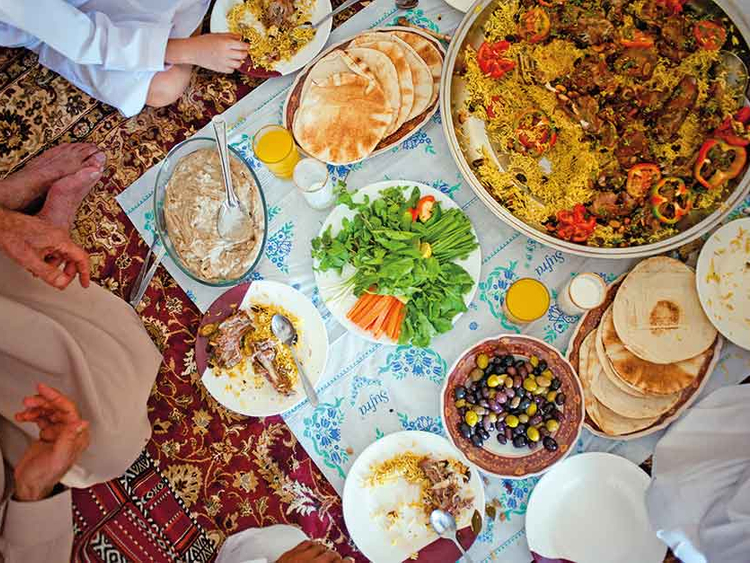I had a coronary artery bypass two years ago. Can I fast this year?
Dr Jairam K. Aithal answers: If it has been more than six months since your heart surgery, it should be fine to fast. The first step is to seek medical advice from your doctor, who is familiar with your case. It is also important to consult your doctor on how to shift the timing of your medications, if you are on any.
A small percentage of people might warrant a decrease in their diabetes or high blood pressure medication, so it is important to consult your doctor regularly.
I am in the second trimester of my pregnancy. Is it safe to fast?
Dr Fahima Hamdan answers: The decision to fast or not during Ramadan can be tailored to a patient’s health and her antenatal course. Pregnant patients with complications such as gestational and pre-gestational diabetes and hypertensive disorders are usually advised not to fast.
In case of a smooth ongoing pregnancy, the patient may fast. However, you must take a few precautionary measures including proper hydration, sufficient intake of calories and adequate sleep and rest to sustain both your own health and that of the foetus.
A critical part of foetal well-being is the foetal movement pattern, especially in the third trimester. Observe the foetal movement during the fasting hours. Report to your physician if you notice any changes in you baby’s regular movements. Consult your obstetrician before you start your fast, followed by proper antenatal check-up to ensure fasting doesn’t affect the foetus and your health.
Can I fast during Ramadan if I have diabetes?
Dr Prakash S. Pania answers: While people with diabetes and chronic problems are exempted from fasting, diabetics can fast and often it is not harmful. It is, however, always advisable to consult your doctor before Ramadan to jointly decide on the most suitable course of action for your condition and how to time or dose your medications/insulin.
Hypoglycaemia or low blood glucose, high blood glucose and dehydration are the three risks a diabetic may face while fasting. People taking insulin are at the risk of hypoglycaemia. It is advisable to limit rigorous physical activity during the fast. Low glucose levels may occur during the day when it is extremely hot and sunny.
Also make sure you don’t end your fast with a very large meal so as to avoid any spike in blood sugar.
What diet should diabetics follow to stay fit during Ramadan and keep sugar levels under control?
Dr Prakash S. Pania answers: While every meal is a celebration during Ramadan, it is wise to follow healthy eating habits even during the month.
Limit your intake of sweets and sugary drinks and eat more healthy fats and lean meat.
Drink lots of water to avoid dehydration. Ramadan meals should be simple, planned well and should contain bread, cereals, fruits, vegetables, fish, meat and milk.
I am a diabetic and travel frequently for work. Suggest some fasting tips for me please.
Dr Prakash S. Pania answers: It is permissible for somebody who travels a lot not to fast during the days of travel and make up for it later. However, people who travel also fast successfully. If you are a diabetic, your ability to fast will depend on how well managed your condition is.
Consult a specialist before you plan your travel as your physician will be able to guide you best based on your condition and the medications you take. This Ramadan, remember to fast in the true spirit and be careful of the feasts.
I take medicines for moderate hypertension regularly and want to fast this Ramadan. What changes do I need to make to my medical regimen without facing complications?
Dr Raja Mohammad Irfan answers: Patients must consult their doctors and schedule their medications, if needed, twice a day, once during suhour and once at iftar. It is important to stay hydrated and drink enough water. Also, it is advisable to cut down on salt and caffeine.
Should I opt for heavy iftars and suhours or smaller meals at regular intervals during the non-fasting hours?
Victoria Tipper answers: Ideally, neither iftar nor suhour should be too heavy as large meals require a lot more energy to digest, leaving a person feeling fatigued. These also promote weight gain. We have noticed that many people do well by eating a number of smaller meals during the non-fasting hours rather than consuming one or two heavy meals. Make sure each meal has a good balance of vegetables (should fill half the plate), protein (around a quarter of the plate), low GI and wholegrain carbs (around a quarter of the plate) and a little healthy fat (avocados, olive oil, coconut oil, organic ghee, grass-fed butter, nuts and seeds).
What foods should I eat for suhour to stay full?
Victoria Tipper answers: For suhour, it is important to eat foods that have a slower rate of digestion, as this helps keep energy levels elevated during fasting hours. All carbohydrates are broken down into units of sugar but they do this at varying speeds.
Choosing complex carbohydrates over simple carbs can help you maintain the energy levels throughout the day. Simple carbohydrates such as bread made from refined flour have a chemical structure of no more than two units of sugar. Complex carbohydrates, usually made from whole grains, are larger in structure, consisting of at least three single units of sugar. It is this complex structure that gives this group of foods a slower rate of digestion, making them ideal for Ramadan. Eat high fibre foods and add beans or lentils to your diet.
What should be my recommended water intake during Ramadan?
Victoria Tipper answers: You need to drink at least two litres of water. It is a good idea to sip water regularly during the non-fasting hours to stay hydrated. Add cucumbers, lettuce, celery, courgettes and aubergine to your diet as these are mostly water.
Fresh fruits are another great source of hydration, with tomatoes, watermelon, grapefruit and apples being some of the best choices. Herbal tea is also a good way of rehydrating the body. Good choices for tea are ginger, peppermint and chamomile. Rooibos tea is also thought to help with digestion and can be used to make a cooling iced tea that is caffeine-free and packed with antioxidants.
What is the ideal time to hit the gym in Ramadan?
Ishi Khosla answers: It is good to exercise during Ramadan either early in the morning after your first meal of the day or in the evening after iftar.
Is a fasted workout good for health? What are the pros and cons?
Jennifer Chalouhi answers: A fasted workout is good for us only if this is done occasionally and safely. But it is best to avoid during Ramadan since
you are fasting for long periods without water. Exercising in a dehydrated state can lead to dangerous consequences.
The key benefit of fasted training is that the body is forced to use stored fat as energy, which aids weight loss and burns fat faster.
What tips do you have for people who can’t fit workouts into their busy Ramadan schedule?
Jennifer Chalouhi answers: It’s acceptable to stay away from intense workouts during Ramadan, especially if you can’t squeeze any time out from your busy schedule. However, you must try to take time out for at least 15 to 20 minutes of brisk walks after iftar to stay healthy and fit.
Can I fast during Ramadan if I have diabetes?
Dr. Prakash S Pania answers: While people with diabetes and chronic problems are exempted from fasting, diabetics can fast and often it is not harmful. It is, however, always advisable to consult your doctor before Ramadan to jointly decide on the most suitable course of action for your condition and how to time or dose your medications / insulin.
Hypoglycemia or low blood glucose, high blood glucose and dehydration are the three key risks a diabetic may face while fasting. People taking insulin are at the risk of hypoglycemia. It is advisable to limit rigorous physical activity during the hours of fasting. Low glucose levels may happen during the day when it is extremely hot and sunny. It is important to make sure that you don’t break your fast with a very large meal, in order to avoid any spike in blood sugar.
What diet should I follow to stay fit during Ramadan and also keep my sugar levels under control?
Dr. Prakash S Pania answers: While every meal is a celebration during Ramadan, it is wise to follow healthy eating habits even during Ramadan. Limit your intake of sweets and sugary drinks, eating more healthy fats and lean meat. Drink lots of water to avoid dehydration. Ramadan meals should be simple, planned well, and should contain bread, cereals, fruits, vegetables, fish, meat and milk.
I am a diabetic and I travel frequently for work. Could you suggest some essential do’s and don’ts of fasting while traveling?
Dr. Prakash S Pania answers: It is permissible for somebody who travels too often to not fast during the days of travel and make up for it later. However, people who travel also fast successfully. If you are a diabetic, your ability to fast will depend on how well managed your condition is. Consult a specialist before you plan your travel as your physician will be able to guide you best based on your condition and the medications you take. This Ramadan, remember to ‘fast’ in the true spirit and be careful of the ‘feasts’.
I had a coronary artery bypass surgery a couple of years ago. Can I fast this year?
Dr. Jairam K. Aithal answers: If it has been more than six months since your heart surgery, then it should be fine to fast. The first step would be to seek medical advice from your doctor who is familiar with your case. It is also important to consult your doctor on how to shift the timing of your medication if you are on any. A small percentage of people might warrant a decrease in their diabetes or high blood pressure medication, so it is important to consult regularly with your doctor.
What are your tips for people who simply just can’t squeeze any time out from their busy Ramadan schedule for regular workouts?
Jennifer Chalouhi answers: It’s acceptable to stay away from intense workouts during Ramadan, especially if you can’t squeeze any time out from your busy schedule. However, you must try to take time out for at least 15 to 20 minutes of brisk walks after Iftar to stay healthy and fit.
While I take medicines for moderate hypertension regularly, I am planning to fast this Ramadan. What changes do I need to make in my medication regimen to fast without any health complications?
Dr. Raja Muhammad Irfan answers: Patients should consult their doctors and schedule their medications, if needed, twice a day, once during Sohoor and once at Iftar. It is important to stay hydrated and take enough water during Iftar and Sohoor. Also, it is advisable to cut down on salt and caffeine.













